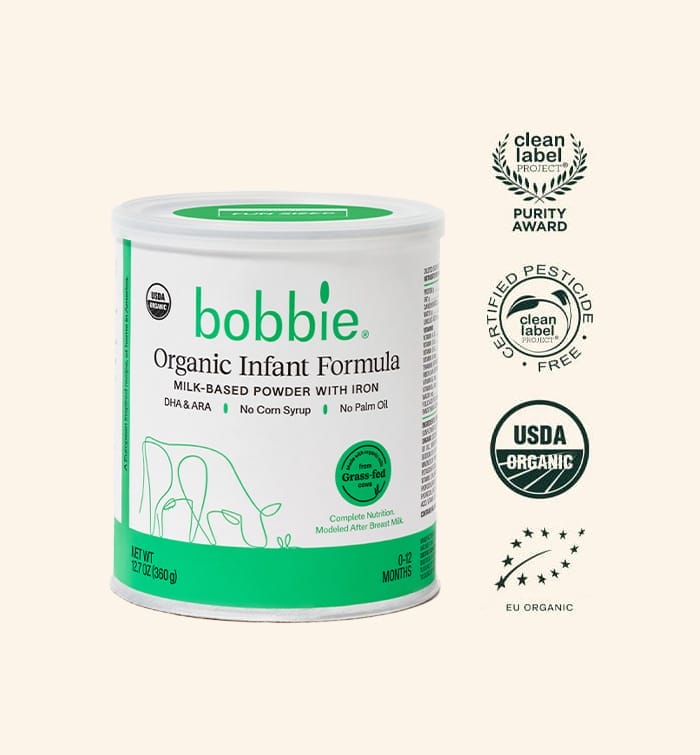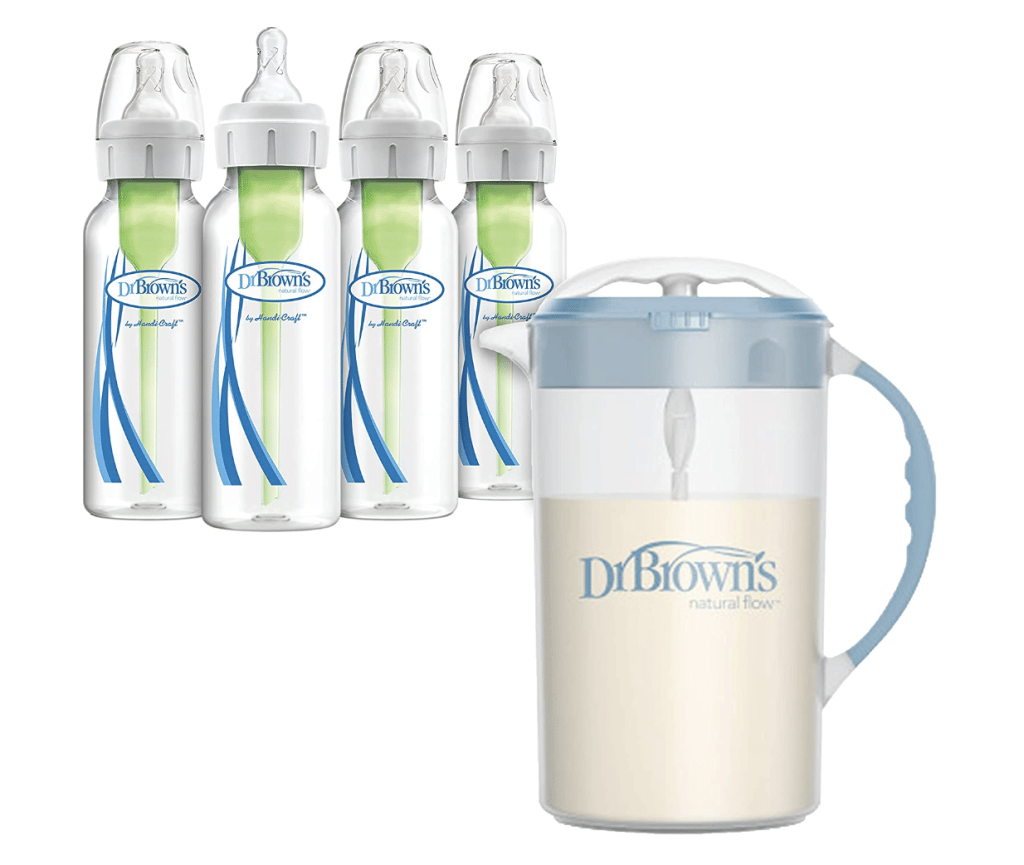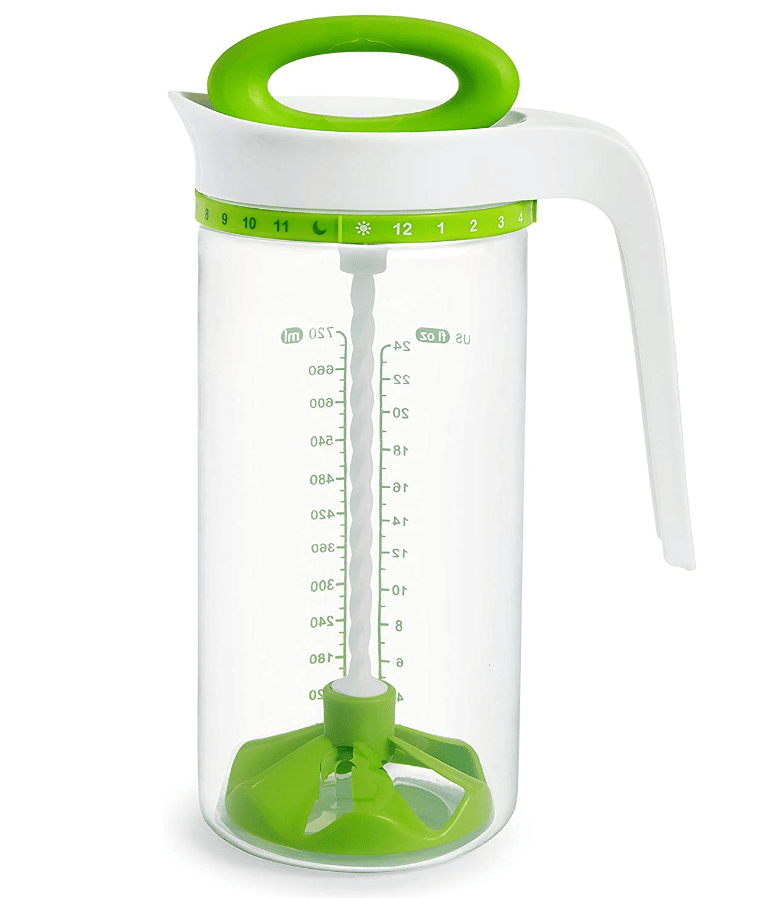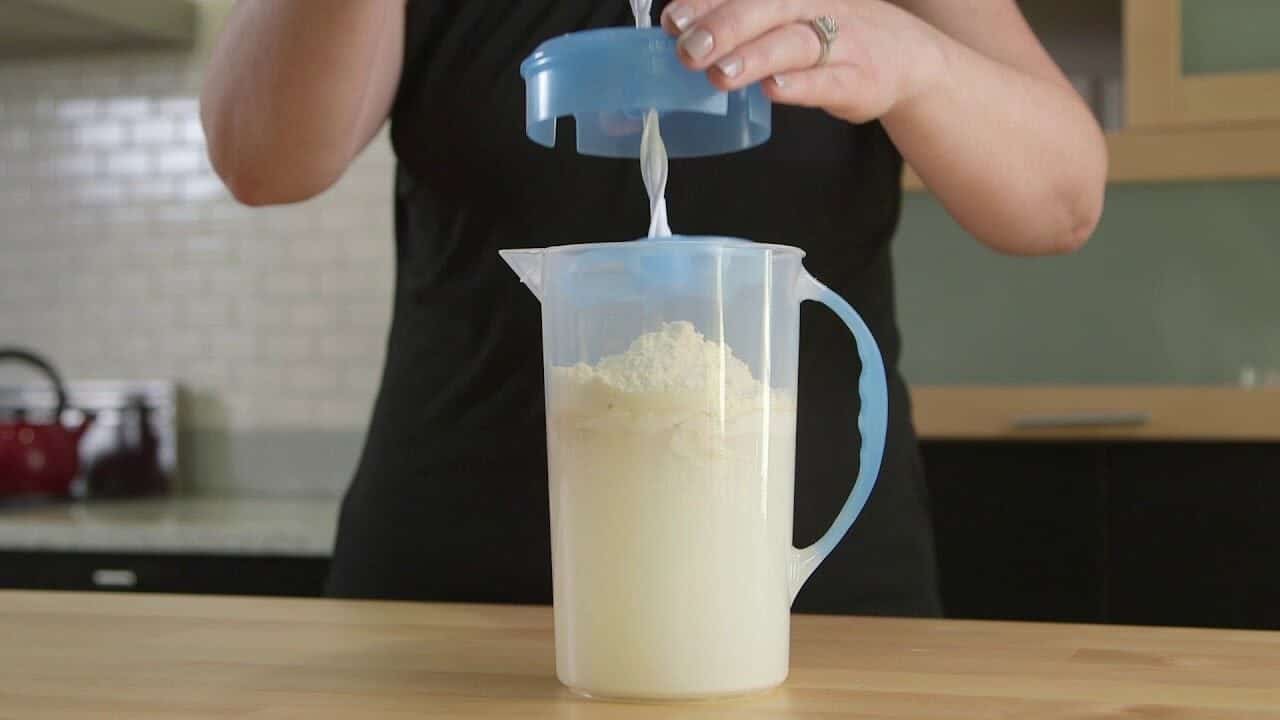We are proud to say that these posts are not sponsored. Our editorial team of Bobbie moms and writers personally select each featured product. If you buy something through our links, we may earn an affiliate commission, at no cost to you.
As new parents, we quickly learn that there are some products we really want (hello SNOO Smart Sleeper) and some we truly need (hands down the Willow Wearable Breast Pump). And then there are some amazing, affordable products, like a formula pitcher, that we want AND need.
Whether you plan to exclusively breastfeed or start your baby with formula, you’ll find there are tons of great products out there for mixing, making, and storing infant formula. And while we love some of the pricier options that mix the formula for you, we also love simpler products that save us time and get the job done— like the formula pitcher.
Should a formula pitcher be on your must-have list? Or is it just another gadget that you can get by without?
We talked with Dr. Jacqueline Winkelmann (“Dr. Jacq”), board-certified pediatrician (and mom), to get the scoop on formula pitchers. We asked her what they were, how to safely prepare formula using a pitcher, and whether or not you actually need to have one.
- What exactly is a formula pitcher?
- Benefits of using a formula pitcher
- Can I make a batch pitcher of formula in advance?
- Do you really need a formula pitcher?
- How long is formula good for in a formula pitcher?
- How long can formula be in the fridge?
- The Formula Mom Reviews Dr Brown’s Formula Pitcher
- Best baby formula pitchers
- Must-do’s when making baby formula
- Do not microwave baby formula
What exactly is a formula pitcher?
A formula pitcher is exactly what it sounds like: a pitcher for formula.
However, these pitchers have mixing “blades” inside of them that mix infant formula without leaving clumps or lumps. Formula pitchers let parents and caregivers prepare an entire day’s worth of formula at once. They can save time and ensure your formula is properly mixed, no matter who’s in charge of baby’s feedings.
Benefits of using a formula pitcher
A formula pitcher is ideal for mixing larger amounts of formula at one time. They’re especially convenient if your baby is in daycare, or going to grandma’s house for the day. Pitchers are much more portable than the larger formula dispensers.”
Dr. Jacq
Can I make a batch pitcher of formula in advance?
YES. And thank goodness. If your baby has already arrived, you know how tiring it is to wake up at 2:00 a.m. and make a bottle for a hungry baby.
Using a formula pitcher lets you mix a larger batch of formula, up to 24 hours in advance, which you can pour into a bottle in the middle of the night. It saves time, and keeps your baby from getting wrongly mixed formula when you’re too tired to think straight.
Using a formula pitcher is also a great way to prepare your baby’s formula for the entire day. Instead of going through the whole mixing routine every few hours, you simply pull the formula pitcher from the fridge and fill a new bottle with perfectly mixed formula.
Mix baby formula without clumping
Clumps in your baby’s formula usually occur from rushed formula preparation. You’re in such a rush to get a bottle prepared for your hungry baby that you don’t mix the formula and water properly. Halfway through the feed, the nipple gets clogged with a clump, and you have to interrupt feeding time to fix it or attach a new nipple.
Using a formula pitcher eliminates the clumps. Formula pitchers usually have a fan like device that twists down into the pitcher and mixes the formula with blades to prevent clumping. Every bottle you pour is smooth and clump-free.

Shop Bobbie Organic Infant Formula
Bobbie Organic Infant Formula is a USDA Organic, EU-style infant formula that meets all FDA requirements. It is a complete nutrition milk-based powder modeled after breast milk and is easy on tummies. It is non-GMO and doesn't have corn syrup, palm oil, or maltodextrin. Learn more about Bobbie.
Do you really need a formula pitcher?
There are times where the ease and safety of preparing formula in advance make it a winning choice. If your baby is going to stay with a friend or relative who doesn’t know how to mix formula, you’ll probably feel better doing it yourself in advance. If you are worried you might make a mixing mistake in the middle of the night when you’re tired, it might make more sense to get that formula ready when you’re wide awake and store it in the fridge for later. If you’re working from home and just want the convenience of ready made, this once a day mixing is so much easier than once every few hours.
In the end, it’s a matter of preference. If you’re expecting your first child and aren’t sure what you’ll use, ask around to others with babies. Read reviews online. If it seems like something that may work well for you, scoop it up and keep the receipt. If you never use it, you can always return it later.
How long is formula good for in a formula pitcher?
While lots of parents use formula pitchers or prepare formula in advance other ways, it is recommended to make each bottle right before feeding it to your baby if possible.1 However, it is only safe to leave formula at room temperature for up to 1 hour once prepared. After that, prepared baby formula can be stored in the fridge for up to 24 hours.2
How long can formula be in the fridge?
Unlike breast milk, formula can not be frozen. Formula is safe in the fridge, however, for up to 24 hours.2
The Formula Mom Reviews Dr Brown’s Formula Pitcher
Dr Brown’s Formula Pitcher gets The Formula Mom stamp of approval! It’s a great option for families who want the convenience of prepared formula without the cost of liquid ready-to-feed options. Here’s why Mallory loves it!
Price: This is one of the most cost-effective baby products around, particularly with regard to cost for value.
Dishwasher safe: The pitcher can be disassembled into parts and washed on the top rack of a dishwasher. It can also be easily hand-washed by rinsing out excess formula, adding warm water and a few drops of soap and then using the mixing handle to agitate the water and soap within the pitcher. Then simply rinse and air dry!
Saves time: During your busy day you don’t need to stop and mix formula every 3 hours.
Creates a smooth formula texture: No shaking means no bubbles to create uncomfortable gas for your baby.
Easy measuring: Allows you to pour the exact amount of formula you need for each bottle (great for babies who drink an odd # of ounces or babies who have a different amount each time!).
Easy to keep track: Allows parents and caregivers to keep track of the total amount of ounces baby is eating each day
Best baby formula pitchers
Best Formula Pitcher Set, Dr Brown’s Natural Flow Formula Mixing Pitcher

This top rated Baby Formula Mixing Pitcher by Dr Brown’s can hold 32 oz of formula for the whole day or night. This set comes with a 4 pack of anti-colic baby bottles, at 8oz each. Add to baby registry immediately— or to your Amazon cart! See above why The Formula Mom rates it her #1 formula feeding product.
Best Formula Pitcher with Built in Time Ring, Munchkin Smart Blend Formula Mixing Pitcher

With over 5500 top rated reviews on Amazon, we know moms love using this pitcher for bottles all day long. It mixed up to 24 oz of baby formula. The best part is that the adjustable time ring keeps track of when formula was prepared, so you never have to keep track yourself.
Must-do’s when making baby formula
Whether you’re mixing your formula in a pitcher or bottle by bottle, it’s important to get it right every time. Read the directions on your baby formula.
Prep before starting your baby formula
When you’re ready to bottle or pitcher prep, wash your hands and prep your bottles, nipples, and your pitcher, if using one, to be sure they are clean and sterile.3
Mixing the baby formula
If you’re mixing with a pitcher, make sure you are using the correct amounts of powder and water for the amount of formula you need to make.
If you’re mixing a single bottle, make sure to shake it long enough to avoid clumps.
Always pay attention to the ratio of formula to water
A correct formula to water ratio is so important. Over-concentrated and diluted formula can both cause major health problems for your baby.
When mixing by hand, make sure to follow the label instructions closely, and when using a formula pitcher or dispenser, you must follow the set up, settings, and cleaning protocols to ensure proper mixing. Make sure to read the manufacturer’s instructions carefully.”
Dr. Jacq
Always use clean drinking water when making a baby bottle
Tap water is usually safe for making infant formula, but if you want to know for sure about the safety of your tap water, you can contact your pediatrician or local health department.1
If your home is supplied by well water, you will need to have your water tested to ensure it is safe for babies.
Do not microwave baby formula
Never microwave your baby’s formula. Microwaving formula can cause hot spots that can burn your baby’s mouth. To heat bottles, sit them in a container of hot water for a few minutes, run them under warm tap water, or use a bottle warmer.3
Final tips on using a batch formula pitcher
The formula pitcher is most convenient when you want to make a large amount of formula at once. Is this something that you want/need? Does it help you as a parent in any way to make larger volumes at once? If the answer is yes, for the cost, these might be well worth it!”
Dr. Jacq

Shop Bobbie Organic Infant Formula
Bobbie Organic Infant Formula is a USDA Organic, EU-style infant formula that meets all FDA requirements. It is a complete nutrition milk-based powder modeled after breast milk and is easy on tummies. It is non-GMO and doesn't have corn syrup, palm oil, or maltodextrin. Learn more about Bobbie.
Sources:
1- Feeding your infant: how to prepare and store baby formula | Cleveland Clinic
2- How to safely prepare formula with water | American Academy of Pediatrics
3- Infant formula preparation and storage | Centers for Disease Control and Prevention

